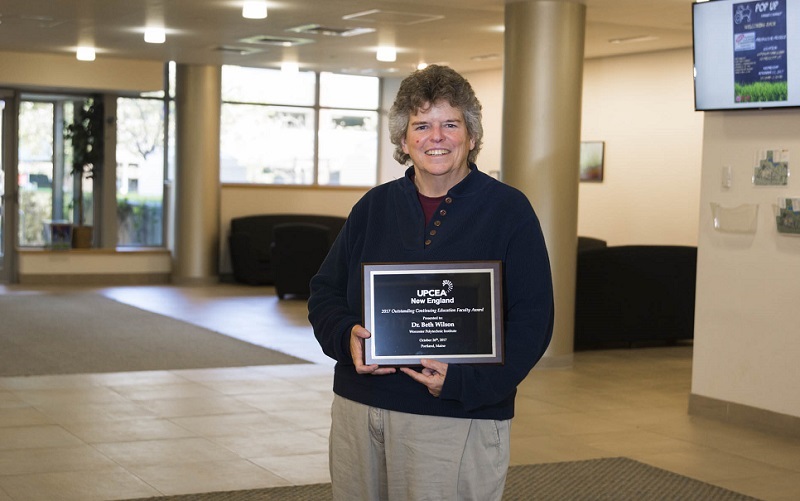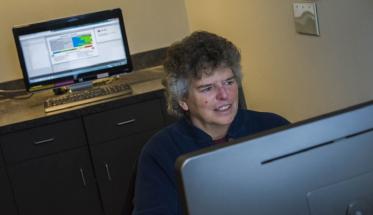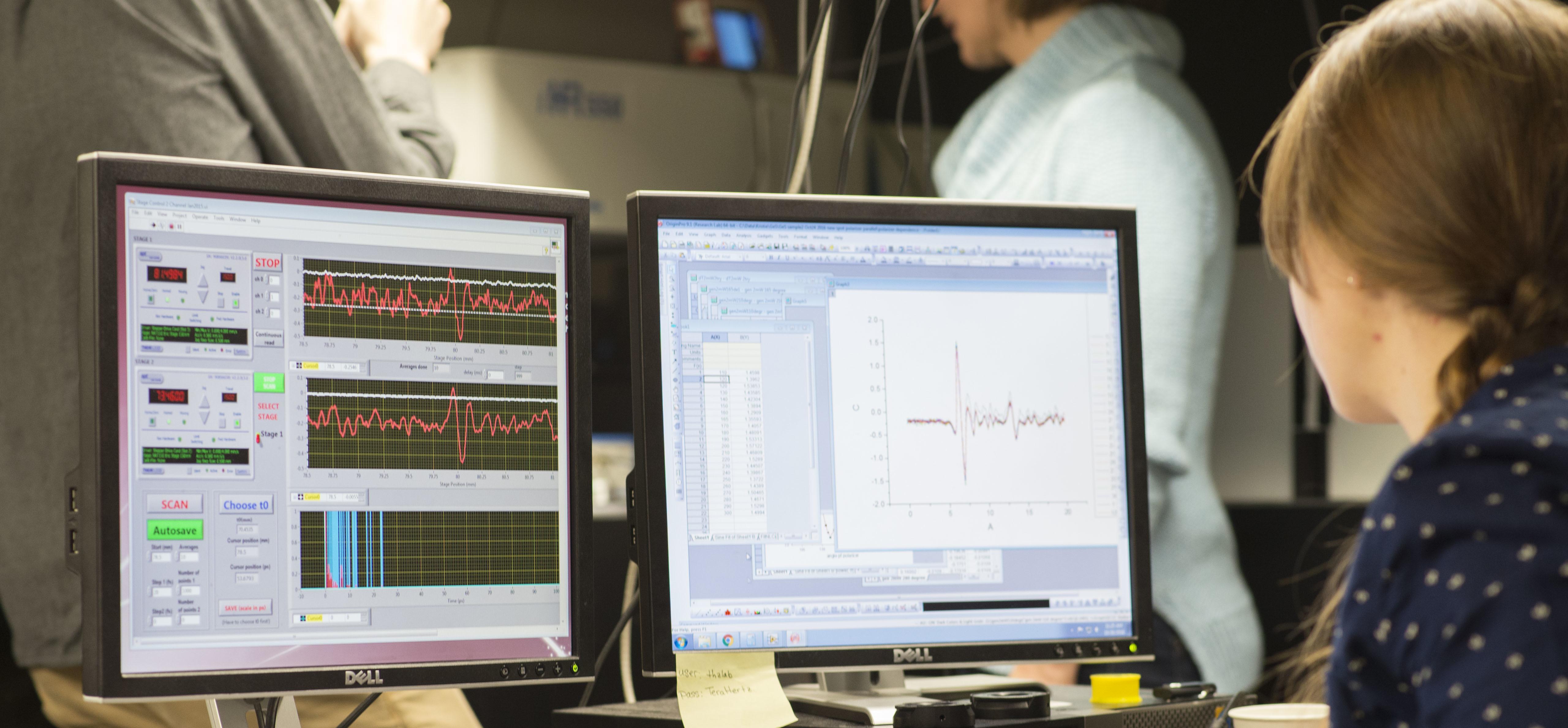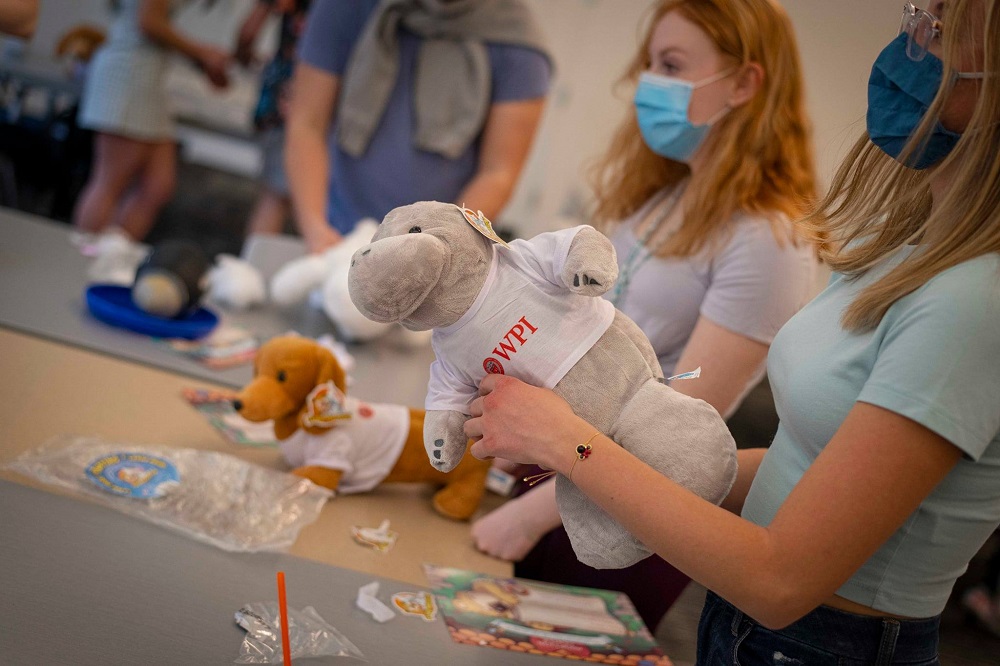Beth Wilson, a systems engineering professor in WPI’s Corporate & Professional Education (CPE), recently won the 2017 Exemplary Teaching Award from the University Professional & Continuing Education Association (UPCEA).
Wilson, who teaches classes for the master’s degree in systems engineering, joined WPI last year after spending 33 years with Raytheon.

Beth Wilson with her Exemplary Teaching Award.
Although she considers herself retired, she teaches to remain active and technically current. Still, she didn’t expect the honor. “I was very surprised,” says Wilson, who has a BS, MS, and PhD in electrical engineering. “I am new to online teaching, so this recognition is the result of The Dream Team (CPE and the Academic Technology Center (ATC) that I have helping me to design, deliver, and improve the courses I teach.”
Before coming to WPI, Wilson was a systems engineer in the aerospace industry, where her experiences teaching her colleagues and peers sparked a passion to teach and inspire others. “I provided some in-house training on topics to accelerate the career path of aspiring technical leaders and taught some classes in an on-site master’s in systems engineering program,” she says. “I felt that it was an honor, privilege, and responsibility to enable the next generation of systems engineers to be successful.”
Using her corporate experience helps Wilson teach, helps her students learn, and was one deciding factor in her award. “Part of her winning the award was from the quality of her teaching in general,” says Adrienne Franciosi, UPCEA New England Regional Conference award chair. “Beth had the corporate experience, but she was also passionate about helping people advance their careers,” she says. “She created a system for her company, a learning pipeline, so the knowledge would transfer. One pipeline was to encourage engineers to become chief engineers. She has that energy and passion and puts that into her online courses.”
Though a new online faculty member, Wilson is familiar with the format. She says she prefers teaching an online class because it presents distinct opportunities to her and to her students to have a learning experience that is satisfying, in-depth, and relevant.
The UPCEA award reflects all she has accomplished, and how she is having an impact on her students. “As someone with a hearing loss, I find online teaching much more accessible to me,” she says. “The students interact with me on the discussion boards and submit written assignments; our synchronous sessions are conducted using the chat window.”
With the basic differences of teaching students who are accessing her class from all corners of the globe, Wilson says adapting to the format required a few tweaks. She wants to make sure students aren’t feeling isolated in the class because they aren’t interacting in person. And because of that distance, she pays special attention to providing clear instructions, comprehensive content, and meaningful assignments.

Beth Wilson
“At first I made online courses a poor imitation of face-to-face classes,” she says, “but after attending the WPI Faculty Institute for Online Teaching program, I now aspire to make the online learning experience the same or better than a face-to-face experience.”
The online experience is different from in-person classes in many ways. Besides the obvious lack of physically meeting, Wilson’s students are working around the clock. She checks on her students’ work and discussions several times throughout the day. “I spend a lot of time grading their assignments to provide feedback on where they can improve, but also where I thought their work was outstanding,” she says. “I set up a discussion board topic for questions about the lecture material or assignments. I check that every morning and use that opportunity to tune into the discussion board threads for that week.”
Wilson’s preparation for a class is as involved as for an in-person class, but in a different way. She records an introductory video so her students know who she is. “That is the only time in the class I have to actually brush my hair,” she quips. Wilson has high goals for her students and expects them to be successful, but also to lead the next generation of systems engineers to the same success.
She also reflects on what seems to be working or not working as the class progresses and presents it to her CPE/ATC team for some brainstorming on how to improve things like content delivery and student engagement. “This continuous improvement model keeps me motivated to deliver quality classes,” she says. “When students contact me during or after the class to describe something they learned that they are using, I am inspired to make it better for the students that follow them.”
To keep her approach fresh, Wilson says she continually places herself in the student role, most recently taking a class at the Worcester Art Museum. “Every year I take a class in something I know nothing about so that I can learn something interesting and remember what it feels like to be a novice,” she says. “I think this makes me a better teacher.” Her schedule hardly matches the typical retirement pattern, but she does take time to “donate golf balls to the ponds and woods” and “ski green dots and blue squares in the winter.” She is also dedicated to bringing hearing access to community members and works with the Hearing Loss Association of America Central Massachusetts chapter.
Franciosi calls Wilson an excellent role model for both her students and her peers. “It is all about each student in her class,” she says. “Beth is invested in delivering excellent content and delivering quality feedback.”
As online learning grows in popularity and accessibility, Wilson says many people stand to reap great personal and professional rewards. “My vision of future online learning is that we will stop acting like it is a consolation prize for face-to-face classrooms,” she says. “The technology available to us and the growing population of adult learners juggling work and family commitments means that online learning will be growing.”
- By Julia Quinn-Szcesuil





